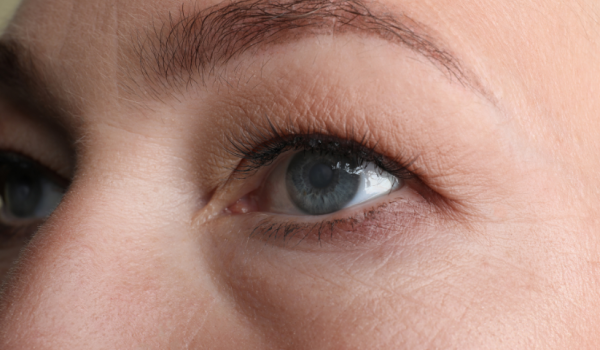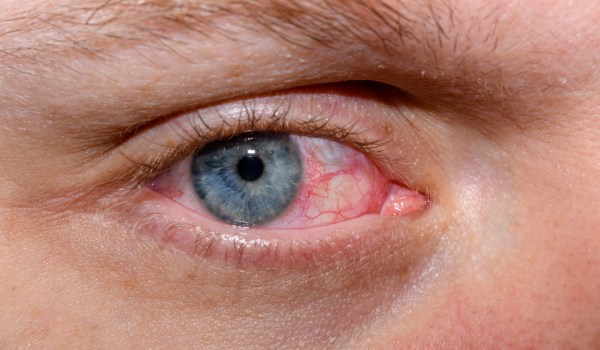Conjunctivitis, which is often referred to as ‘pink eye’, is an inflammation or infection of the conjunctiva, which is the thin, transparent tissue that covers the white part of the eye and lines the inner surface of the eyelids. Conjunctiva is a type of tissue called mucous membrane, if you run your tongue along the inside of your cheeks, you are feeling the mucous membrane lining your cheeks.
In general, conjunctivitis is not considered to be dangerous or threatening to sight and tends to clear up with no direct treatment after a few days to a week.
However, the severity of symptoms and potential complications can vary depending on the underlying cause and individual circumstances.
Conjunctivitis Symptoms
The symptoms of conjunctivitis, regardless of its cause, may include:
- Redness: The white part of the eye (sclera) may appear pink or red.
- Itchiness: The affected eye or eyes may feel itchy and irritated.
- Watery eyes: Excessive tearing or a watery discharge from the eye is common.
- Discharge: Depending on the type of conjunctivitis, there may be a discharge from the eye. Viral conjunctivitis often has a clear or slightly white discharge, while bacterial conjunctivitis may produce a thicker, yellow or greenish discharge.
- Grittiness or foreign body sensation: It may feel like there is something in the eye, causing discomfort.
- Sensitivity to light: Some individuals with conjunctivitis may experience sensitivity to light (photophobia).Swollen eyelids: The eyelids may appear swollen or puffy.
- Crust formation: When waking up in the morning, there may be crusts or dried discharge around the eyelashes.
- Blurred vision: In some cases, conjunctivitis can cause temporary blurred vision.
It is important to note that these symptoms can vary depending on the cause of conjunctivitis. Allergic conjunctivitis, for example, may also involve sneezing, itching of the nose or throat, and a history of allergies. Infectious conjunctivitis often accompanies upper respiratory chest infections and a sore throat.
What causes Conjunctivitis?
Conjunctivitis can have various causes, including:
Viruses: Viral conjunctivitis tends to be the most frequent type of conjunctivitis is highly contagious and is often associated with the common cold or respiratory infections. It can be caused by adenoviruses, picornaviruses (such as enteroviruses and coxsackieviruses), and others.
Bacteria: Bacterial conjunctivitis can occur when certain types of bacteria infect the eye. Common bacteria that can cause conjunctivitis include Staphylococcus aureus, Streptococcus pneumoniae, and Haemophilus influenzae. Typically, bacterial conjunctivitis is associated with a yellow, thick discharge.
Allergies: Allergic conjunctivitis is triggered by an allergic reaction to substances like pollen, pet dander, dust mites, or certain medications. It is not contagious and often affects both eyes. Seasonal allergic conjunctivitis typically occurs in the Spring and Summer months and is triggered by grass and or tree pollens. Perennial allergic conjunctivitis occurs year round and may be linked to an allergy to house dust mite. Some eye drops can also trigger allergic conjunctivitis, particularly those containing certain preservatives e.g. BAK.
Irritants: Chemicals, pollutants, smoke, or foreign bodies in the eye can cause irritant conjunctivitis. This type of conjunctivitis is not infectious.
Medical conditions: Certain medical conditions can be associated with conjunctivitis, particularly those linked with disorders of the skin.
Is conjunctivitis contagious?
Conjunctivitis can indeed be contagious, depending on the underlying cause. Viral and bacterial conjunctivitis, in particular, are highly contagious.
They can spread from person to person through direct contact with infected eye secretions or respiratory droplets.
For example, if an infected person touches their eyes and then touches objects or surfaces without proper hand hygiene, the virus or bacteria can be transferred, and others who come into contact with those objects or surfaces may become infected.
It is important to note that not all types of conjunctivitis are contagious. Allergic conjunctivitis, which is caused by an allergic reaction rather than an infection, is not contagious.
To prevent the spread of contagious conjunctivitis, it is advisable to practice good hygiene, such as washing hands frequently, avoiding touching or rubbing the eyes, and avoiding sharing personal items like towels, pillowcases, or eye makeup.
Conjunctivitis Treatments
The treatment for conjunctivitis depends on the underlying cause:
Viral conjunctivitis: Since viral conjunctivitis is typically self-limiting, treatment focuses on relieving symptoms and preventing the spread of infection. Your healthcare provider may recommend the following:
- Applying warm compresses to the affected eye(s) to reduce discomfort.
- Using over-the-counter lubricating eye drops to alleviate dryness and irritation.
- Practicing good hygiene, such as frequent handwashing and avoiding touching or rubbing the eyes.
- Avoiding the use of contact lenses until the infection has resolved.
If necessary, your doctor may prescribe antiviral eye drops or ointments in severe cases or if complications arise.
Bacterial conjunctivitis: Bacterial conjunctivitis is often treated with antibiotic eye drops or ointments to eliminate the bacteria causing the infection.
Your healthcare provider will determine the appropriate antibiotic based on the specific bacteria involved. It’s essential to complete the full course of antibiotics as prescribed, even if symptoms improve, to ensure complete eradication of the infection.
Allergic conjunctivitis: Treatment for allergic conjunctivitis focuses on managing the underlying allergy. Your healthcare provider may recommend:
- Avoiding known allergens or triggers whenever possible.
- Using over-the-counter or prescription antihistamine eye drops to alleviate itching and redness.
- Taking oral antihistamines or other allergy medications to address systemic allergy symptoms.
- Irritant conjunctivitis: If conjunctivitis is caused by an irritant, the primary approach is to remove or avoid the irritant. Rinsing the eyes with artificial tears may help flush out the irritant and alleviate symptoms.
- Wearing glasses or sunglasses to protect the eyes in areas of high allergen exposure e.g. walking across a field.
- Using a cold compress to vasoconstrict the blood vessels in the conjunctiva can also help to soothe itchy eyes.
It’s important to consult a healthcare professional for an accurate diagnosis and appropriate treatment plan for conjunctivitis. They can evaluate your symptoms, identify the underlying cause, and recommend the most suitable treatment options for your specific situation.
Medical Disclaimer
This article is for information purposes only and should not be considered medical advice. If you or any other person has a medical concern, you should consult with your health care provider or seek other professional medical treatment. Never disregard professional medical advice or delay in seeking it because of something that you have read on this blog, website or in any linked materials.







